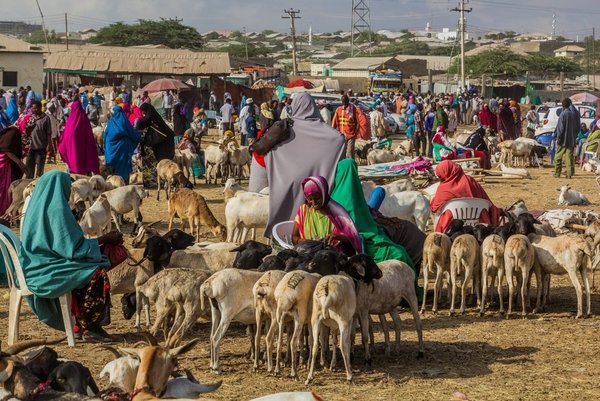 Read this article in French
Read this article in French- Share this article
- Subscribe to our newsletter
Swiss-Ethiopian research partnership for preventing zoonotic diseases
Yahya Osman lives and works in Jijiga, the capital of Ethiopia’s Somali Region which borders Somalia, Kenya and Djibouti to the east. Food insecurity, water scarcity, droughts, poor sanitation infrastructure and soil erosion define the lives of about seven million people in the region.
Osman works as a veterinary doctor and epidemiologist at Jigjiga University where he has first-hand experience of how outbreaks of zoonoses take a heavy toll on the population. "In the past twelve months, we have already had several rabies outbreaks in two districts. Over 50 persons were infected," he says. An outbreak of anthrax has also been recently detected. The disease is often fatal both in animals and humans. "The climate crisis has also changed the dynamics of disease outbreaks," says the veterinarian.
The pastoralists and agropastoralists in the Somali Region are dependent on their animals and agriculture. Their diet largely comprises animal products. In times of distress, they also slaughter and eat sick animals for lack of any alternatives. This is conducive to the spread of infectious zoonotic diseases such as rabies, anthrax, brucellosis, bovine tuberculosis, Q fever and Rift Valley fever.
Partnership for better public health
Osman is part of the Jigjiga University One Health Initiative (JOHI) and completes his PhD in epidemiology at the University of Basel. The initiative is based on a collaboration between Jigjiga University, the Armauer Hansen Research Institute in Addis Ababa and the Swiss Tropical and Public Health Institute (Swiss TPH) in Basel which is associated with the University of Basel.
JOHI was conceptualised by Swiss veterinarian Rea Tschopp who lives in Ethiopia and Jakob Zinsstag, professor of epidemiology at the Swiss TPH and a pioneer of One Health The common goal is to develop research capacities and One Health know-how at Jigjiga University to improve public health delivery for under-served communities in the Somali Region. The exchange programme which was launched with the University of Basel for this purpose continues to train doctoral students from Ethiopia. The ten-year research and development project (2015-26) is funded by the Swiss Development Cooperation (SDC).
A key element of the project has been the establishment of integrated disease surveillance units where human and veterinary doctors work closely together. The first unit was set up in 2017, consisting of one focal person on animal health and one for human health. The physical proximity is to ensure that both are able keep each other updated about developments at their end. All data pertaining to zoonotic disease surveillance in the district is also collected here, for instance test results from milk samples.
If phleboviruses that cause Rift Valley fever suddenly show up, the surrounding communities are given an early warning. The virus is transmitted to humans through milk, blood or mosquitos. It may cause brain infection and internal haemorrhaging which can prove fatal in 50 per cent of cases. Meanwhile two more such surveillance units have also been set up in close cooperation with local authorities in other districts.
Early warning system for sustainable pasture management
Seid Mohamed Ali is one of the researchers at Jigjiga who completed their doctorate at the University of Basel. He studied geography and is specialised in environmental health with a focus on changes to pastoral land. "Almost 100 per cent of livestock fodder in the Somali Region comes from pastureland," he explains. "The health of pastoralists is thus directly linked to the health of this ecosystem." However, the ecosystem is under severe stress. Population growth has led to many areas being heavily overgrazed, and invasive species are able to spread more easily. "Woody plants have become much denser in many places, while grasses are disappearing," says Ali.
The relentless drought in the Horn of Africa is an added factor. "It kills animals not merely because they can no longer find food or water but also because they eat poisonous plants." Medicinal plants that were traditionally used to treat people and animals are also vanishing.
Ali is currently working on an early warning system whereby he combines traditional knowledge with modern technology to facilitate sustainable land management. He uses satellite images to analyse and identify areas with vegetation degradation which should be protected and locations with sufficient fodder and water availability for animals.
Ali says that the fruitful cooperation with colleagues in Basel has benefited students in the entire region. The six PhD students who are trained under the JOHI programme are currently teaching Master’s students in One Health in Jijiga and nearby Somaliland. His goal in the medium term is "…to establish a centre at our university for research as well as teaching on One Health which will also serve as an interface for cooperation with universities worldwide."
(Samuel Schlaefli/SDC/wi)





Add a comment
Be the First to Comment